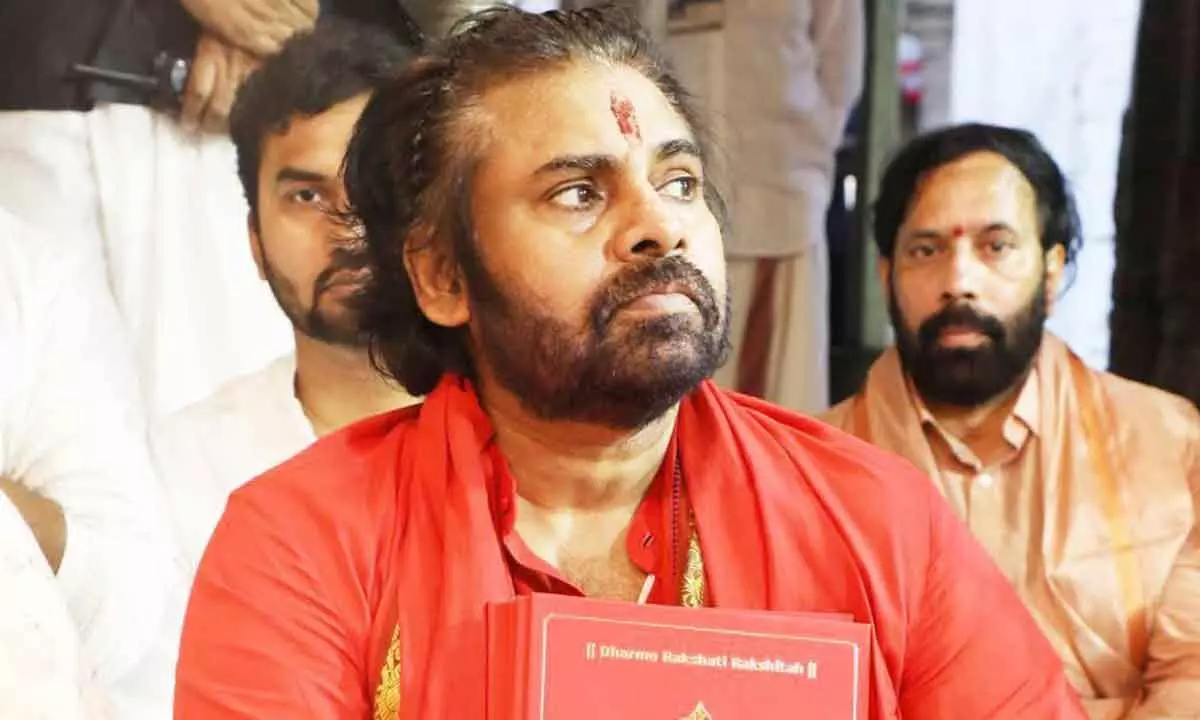Pawan’s secularism was not a one-way street gaining support

The Andhra Pradesh Deputy Chief Minister Pawan Kalyan’s continuous tirade against the reported discrimination of ‘Sanathana Dharma’ and ‘Hindu Dharma’ turned a shot in the arm of several quarters demanding decolonisation of the Hindu Charitable and Endowment Act.
Hyderabad: The Andhra Pradesh Deputy Chief Minister Pawan Kalyan’s continuous tirade against the reported discrimination of ‘Sanathana Dharma’ and ‘Hindu Dharma’ turned a shot in the arm of several quarters demanding decolonisation of the Hindu Charitable and Endowment Act.
Speaking to The Hans India, a joint secretary rank officer in the State Revenue Department of Andhra Pradesh pointed out, “This is the first time in the history of Telugu States that any top political functionary is openly coming out questioning the secular-sacred division.”
“The discontent on the overriding power enjoyed by the State governments under the disguise of the Hindu Charitable Endowments Act has been very much present for decades. However, it has been getting traction in isolation with the ‘free temples’ demand. Particularly, the demand for free temples from the government control got mainstreamed with a series of incidents that resulted in legal battles in Tamil Nadu and went to their peak, with people, particularly women in Kerala in their thousands hitting the streets in the wake of the Sabarimala Temple case,” the officer added.
Vishwa Hindu Parishad National Spokesperson Dr Ravinuthala Shashidar said, “Till date, for many it is only an issue being raised by the religious institutions and organisations associated with the Hindu organisations. However, anyone who has gone through the functioning of the temple management and its assets presents a different picture like rampant corruption, disposing of temple assets in the name of auctions for a song. The highest officials in the Endowment Department lease the temple assets, particularly, the agricultural lands for throwaway prices to the people recommended by the ruling party politicians.”
“Also, there were several occasions in which the Endowment Department failed to oppose the land and asset acquisition by the government to demand adequate compensation. Because of the pressure mounted on the Endowment Department officials to toe the government’s line. There were also incidents in which the advocates representing the cause of the Endowment Departments were not actively fighting the interests of the temples and other Hindu endowments. These are only a few brazen acts, to list out, how the mission disempowers the temples at the behest of the endowment department under the Act,” he said.
For long the government did not heed the issues of ‘one-way street secularism’ the Andhra Pradesh Deputy CM highlighted.
“The political leadership is Hindus and those actively supporting the decisions of the political leadership in the bureaucracy are also Hindus,” said Durga Prasada, an advocate. “However, there are marked changes that have been taking place on the issue of secular-sacred division under which the State government exercises unbridled power controlling even the sacred part of the temple affairs. Even the apex court raised questions about the secular State government or State controlling the Hindu religious and endowment institutions. Pawan Kalyan’s argument that ‘secularism is not a one-way street’ is sure to have a huge impact on the issues of temple management and endowment departments in South India. The reason is, that all the endowment acts adopted by the Southern States stem from the endowment act enacted in the Madaras State. The said act in itself is a relic that comes from a colonial endowment act,” he said.







